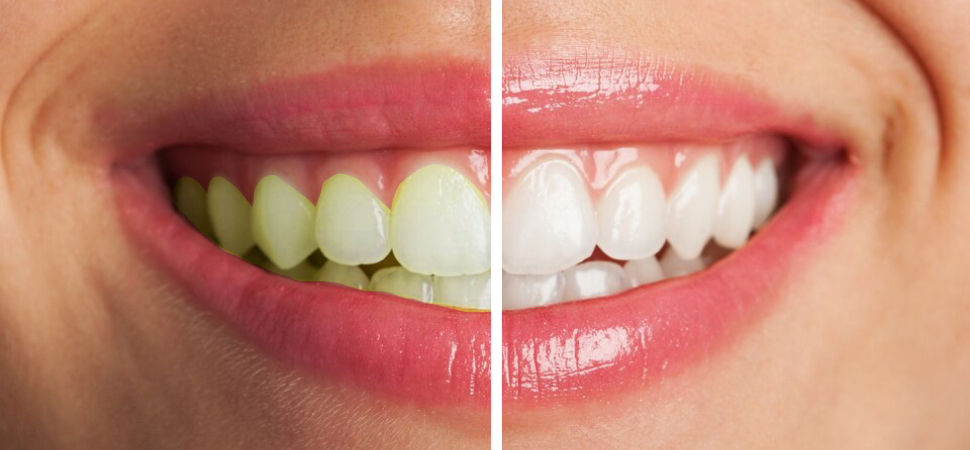Why Do Teeth Turn Yellow?

If you've noticed that your teeth are slowly becoming yellow, it's important to understand what may be causing the discoloration. A mix of external and internal factors commonly causes this discoloration. External factors mainly involve the buildup of stains on the enamel of your teeth, which can be caused by consuming certain foods, drinks, or tobacco products.
Drinks such as coffee, tea, red wine, and smoking are known to contribute to these surface stains. The good news is that yellow teeth don't necessarily need to be a lifelong condition. There are numerous teeth-whitening techniques available to help reduce this discoloration.
1. Oil Pulling

Oil pulling is a long-lived oral hygiene practice involving swishing edible oil, such as coconut or sesame, in your mouth for a specific period, typically around 15-20 minutes. This practice is believed to have originated in traditional Indian medicine, Ayurveda, and is thought to offer various oral health benefits. Practitioners of the oil-pulling claim that it has multiple benefits, like teeth whitening, improving bad breath, reducing gum inflammation, and promoting overall oral health.
2. Hydrogen Peroxide

If you're looking for home remedies to brighten your teeth, hydrogen peroxide can be a great option. Mix equal quantities of hydrogen peroxide and water to use it as a mouthwash. If you want to make a paste, mix water and hydrogen peroxide with baking soda until you get a thick consistency. Ensure you use it in moderation, as too much can cause sensitivity and damage your tooth enamel. On the safer side, it's always a good idea to check with your dentist before you include hydrogen peroxide in your oral care routine.
3. Baking Soda

This common household item is a mild abrasive that can remove stains from your teeth. To use it, simply mix a small amount of water to form a paste and brush your teeth a few times a week. You may start noticing a brighter, more radiant smile with regular use. Make sure to rinse thoroughly afterward to avoid any lingering residue.
4. Activated Charcoal

Have you heard about activated charcoal when it comes to teeth whitening? It's actually pretty amazing! Activated charcoal is known for its adsorption properties, which can help remove surface stains. One way to use it is by brushing your teeth with a charcoal powder or adding it to your toothpaste. It's a safe and effective way to brighten your smile!
5. Whitening Toothpaste and Mouthwashes

One way to improve your teeth' brightness is by whitening toothpaste. These kinds of toothpaste are specially formulated with mild abrasives and chemicals that can effectively remove surface stains and prevent further discoloration. You can also try using whitening mouthwashes with hydrogen peroxide or other whitening agents. These mouthwashes not only help to whiten teeth but also freshen breath. They are often used as a complementary product to other whitening methods, so consider combining them with other teeth whitening techniques to achieve the best results.
6. At-Home Teeth Whitening kits

If you're looking for a more personalized option, plenty of over-the-counter teeth whitening kits are available. These kits, including whitening strips, gels, and trays, offer a convenient and affordable way to whiten your teeth from the comfort of your home. And many of them now contain enamel-safe ingredients, so you can enjoy effective results without worrying about damaging your teeth. So, if you're ready to get a brighter, more confident smile, try one of these kits today!
7. In-Office Professional Teeth Whitening

In-office professional teeth whitening is a cosmetic dental procedure that is performed by a dentist or dental hygienist to achieve noticeable and often immediate teeth whitening results. It's a popular choice for individuals looking for an easy and effective way to brighten their smile. Consulting with a dentist is crucial to determine if this treatment suits you and ensure that your oral health is not compromised during the process.
Having a bright smile instantly boosts your confidence, making you feel good about yourself. While it is normal for teeth to turn yellow, natural options like oil pulling, baking soda, and hydrogen peroxide can help whiten teeth. For faster results, professional treatments like in-office teeth whitening can be a good option too.
When it comes to teeth whitening, no two people are exactly alike. Our teeth are shaped by our genetics, habits, and lifestyle choices, so what works for you might not work for another. Just remember that before you start any whitening regimen, it's important to talk to a dentist to find out what would work best for you. Follow any of our methods, maintain good oral hygiene, and keep your teeth white for a long time.









.jpg?updatedAt=1735200955338)
.jpg?updatedAt=1735197007532)